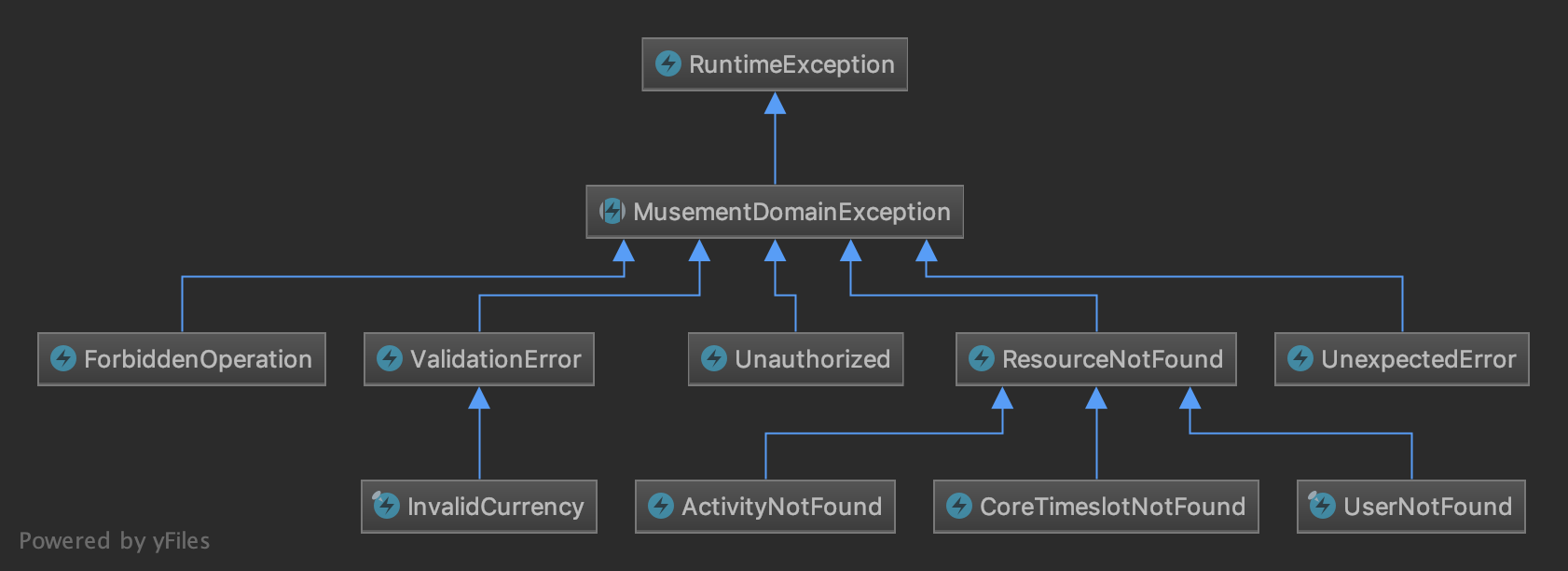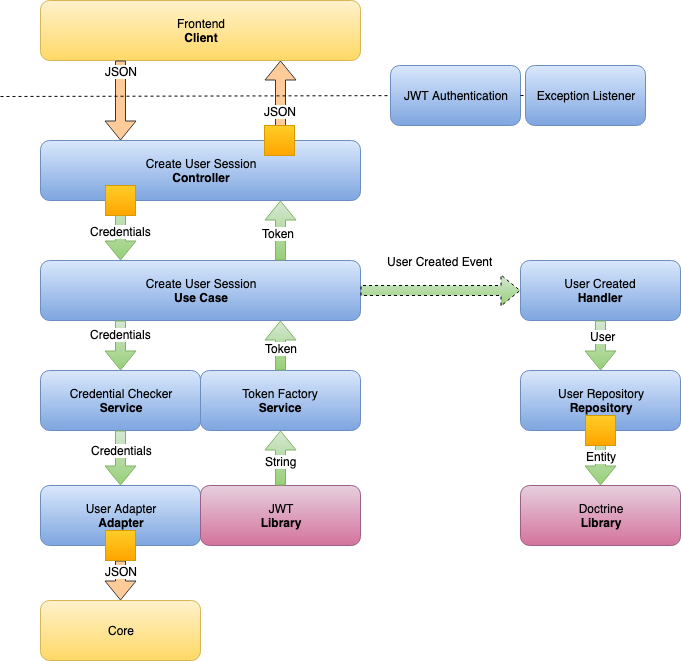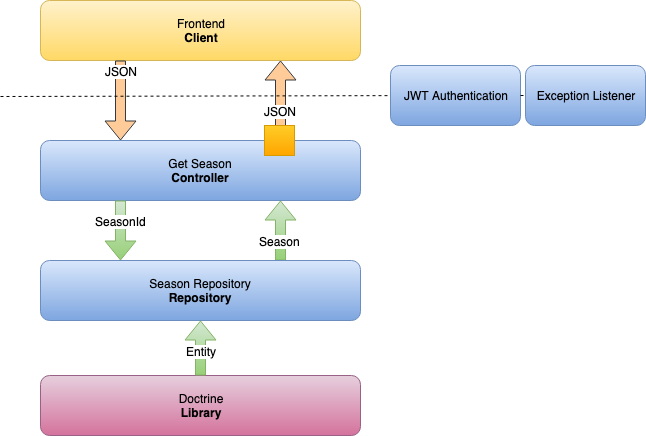Business Platform
Report
What we found
- God Objects
- No Authentication
- Copy and paste everywhere
- A lot of passtrough methods
- Core errors forced at 401 (a lot of them)
- No proper error handling
- No input validation
- No status codes (always 200)
- Domain logic fragmented everywhere with an unclear separation
Issues (1)
- Dependencies injected through '$container->get()'
- No type hinting
- No documentation
- No features mapping
- 2 different api version (no idea on what was used)
- No domain know how
- Prototype quality
- Poor architectural design
- PHP 7.0
- Symfony 3.1.6
Issues (2)
4471 | src/AppBundle/Controller/Platform/ContentController.php
2858 | src/Musement/ApiClient/MusementApiClient.php
2231 | src/AppBundle/Controller/Api/ApiController.php
1992 | src/AppBundle/Controller/Platform/UpdateEventController.php
1591 | src/AppBundle/Controller/Api/v2/EventDateController.php
1512 | src/AppBundle/Controller/Api/v2/SupplierController.php
1346 | src/AppBundle/Controller/Api/v2/EventController.php
1288 | src/AppBundle/Controller/Platform/CreateEventController.php
574 | src/AppBundle/Command/EventUpdateRequestsCommand.php
525 | src/AppBundle/Command/OrdersExcelCreationCommand.phpGOD objects
Just few examples
No Authentication
if (!isset($headers['tk'])) {
$httpResponse->setContent(
\json_encode((object) [
'data' => [
'error' => (object) [
'code' => 'TEXT_OK',
'message' => 'Wrong arguments.'
]
]
])
);
return $httpResponse;
}
Copy and paste (1)
$client = $this->getApiClient();
$httpResponse = new JsonResponse();
// Allow all websites
$httpResponse->headers->set('Access-Control-Allow-Headers', 'Access-Control-Allow-Origin,Content-Type,tk,role');
$httpResponse->headers->set('Access-Control-Allow-Methods', 'GET,OPTIONS');
$httpResponse->headers->set('Access-Control-Allow-Origin', '*');
$headers = $request->headers->all();
if (!isset($headers['tk'])) {
$httpResponse->setContent(\json_encode((object) ['data' => ['error' => (object) ['code' => 'WRONG_ARGS', 'message' => 'Wrong arguments.']]]));
return $httpResponse;
}
$response = $client->getCities();
$result = (object) ['data' => (array) $response];
$httpResponse->setContent(\json_encode($result));
return $httpResponse;Copy and paste (2)
$client = $this->getApiClient();
$httpResponse = new JsonResponse();
// Allow all websites
$httpResponse->headers->set('Access-Control-Allow-Headers', 'Access-Control-Allow-Origin,Content-Type,tk,role');
$httpResponse->headers->set('Access-Control-Allow-Methods', 'PATCH,OPTIONS');
$httpResponse->headers->set('Access-Control-Allow-Origin', '*');
$headers = $request->headers->all();
if (!isset($headers['tk'])) {
$httpResponse->setContent(\json_encode((object) ['data' => ['error' => (object) ['code' => 'WRONG_ARGS', 'message' => 'Wrong arguments.']]]));
return $httpResponse;
}
$response = $client->getCountries();
$result = (object) ['data' => (array) $response];
$httpResponse->setContent(\json_encode($result));
return $httpResponse;Response always 200
list($response, $statusCode) = $client->getLoggedSupplierTicketHolders($accessToken[0]);
if (200 !== $statusCode) {
$result = (object) [
'error' => (object) [
'message' => $response,
'http_code' => $statusCode
]
];
} else {
$result = (object) ['data' => $response];
}
return new JsonResponse($result);Passtrough methods (1)
public function getActivityDatesV2($eventId, $params, $currency = 'USD')
{
$endpoint = \sprintf('activities/%s/dates', $eventId);
try {
$response = $this->request('GET', $endpoint.'?'.\http_build_query($params), [
'headers' => [
'Accept' => 'application/json',
'X-Musement-Version' => '3.2.0',
'X-Musement-Currency' => $currency,
],
]);
} catch (Exception $e) {
return [$e->getCode().' | '.$e->getResponse()->getBody()->getContents(), 401];
}
return [GetEventDatesMapper::map($response), $response->getStatusCode()];
}Passtrough methods (2)
public function activityDatesTimeslotsPatchV2($accessToken, $eventId, $day, $time, $payload)
{
$endpoint = \sprintf('activities/%s/dates/%s/timeslots/%s', $eventId, $day, $time);
try {
$response = $this->request('PATCH', $endpoint, [
'headers' => [
'Accept' => 'application/json',
'X-Musement-Version' => '3.2.2',
'Authorization' => 'Bearer '.$accessToken,
],
'json' => $payload,
]);
} catch (Exception $e) {
return [$e->getCode().' | '.$e->getResponse()->getBody()->getContents(), $e->getCode()];
}
return [ActivityDatesPatchMapper::map($response), $response->getStatusCode()];
}Spaghetti code
class EventSentToOnline extends Event
{
public function eventSentToOnline(EntityManager $entityManager, Container $container)
{
$this->notificationRepository = $entityManager->getRepository('AppBundle:Notification');
$this->eventRepository = $entityManager->getRepository('AppBundle:Event');
$this->setpRepository = $entityManager->getRepository('AppBundle:Step');
$this->mailer = $container->get('mailer');
$this->templating = $container->get('templating');
$event = $this->eventRepository->find($this->eventId);
$notification = new Notification();
$notification->setMessage($event->getTitle().' is now Online');
$notification->setActivityId($this->eventId);
$notification->setStatus('UNSEEN');
$notification->setType('EVENT_ONLINE');
$notification->setUserId($event->getSupplierId());
$notification->setUserType('supplier');
$notification->setCreatedAt(new \DateTime('now'));
$entityManager->persist($notification);
$entityManager->flush();
}Dependencies injected to a method
Dependency getted from the container and never used
Hardcoded strings
Persistence inside an event???
What was done
Requirements
In the last 2 years we tried to build the platform but we fail cause several issues and poor software quality.
Improve and stabilize it cause it will be very important in the near future.
Approach taken
- Keep what works
- Refactor what is affected by new features
- Segregation between new and old code
(Strangler pattern)
Biggest improvement
Centralized Authentication (with JWT)
class JwtAuthMiddleware
{
public function onKernelRequest(GetResponseEvent $event) { /* ... */ }
}
Centralized exception handler
private function renderValidationError(ValidationError $exception): JsonResponse
{
$response = JsonResponse::create(
[
'message' => $exception->getMessage(),
'type' => $exception->getType(),
],
Response::HTTP_BAD_REQUEST
);
return $response;
}
private function renderResourceNotFound(ResourceNotFound $exception): JsonResponse
{
return JsonResponse::create(
[ 'message' => $exception->getMessage() ],
Response::HTTP_NOT_FOUND
);
}
private function renderUnauthorized(Unauthorized $exception): JsonResponse
{
return JsonResponse::create(
[ 'message' => $exception->getMessage() ],
Response::HTTP_UNAUTHORIZED
);
}Domain Exceptions

Core proxy
catch-all:
path: /api/v3/{req}
defaults: { _controller: business_platform.proxy.core.controller }
requirements:
req: ".+"Separation between Frontend and Backend
Explicit class dependecies
public function __construct(
CredentialChecker $credentialChecker,
TokenFactory $tokenFactory,
EventDispatcher $eventDispatcher
) Strong type checking and data safety through immutable value objects
final class Email
{
/* ... */
public function __construct(string $email)
{
$this->assertNotEmpty($email);
$this->assertIsEmail($email);
$this->email = $email;
}
final class DateRange implements \IteratorAggregate
{
/* ... */
public function __construct(Date $from, Date $to)
{
if ($from->greaterThan($to)) {
throw new ValidationError(self::class, 'Invalid date range');
}
$this->from = $from;
$this->to = $to;
}
"require": {
"nelmio/cors-bundle": "^1.5"
}Centralized CORS
Consistent architecture & Naming convention
Controllers
Get the input and call the use case. Format the response
Use cases
Responsible for the domain business logic. Feature-based.
Mappers
Transform raw data into domain value objects
(and vice-versa)
Repositories
Responsible for the domain entities persistence
Consistent architecture & Naming convention
Entities and Value Objects
Autovalidating and almost immutables.
Describes the domain data
(except for specific cases)
Services
Contains logic shared between several use cases.
Adapters
Connect the application to an external domain (ex: Core)
Handlers
Executes code after an event occured

Example 1
Clean and expressive code
/* CreateUserSessionController */
public function __invoke(Request $request)
{
$json = $this->parseJson($request);
$credentials = $this->getCredentials($json);
$token = $this->userSession->create($credentials);
return JsonResponse::create([
'token' => (string) $token,
'role' => (string) $token->role(),
'uuid' => $token->userId()->value(),
], JsonResponse::HTTP_CREATED);
}
private function getCredentials($json): EmailAndPasswordCredentials
{
$credentials = new EmailAndPasswordCredentials(
new Email($json[self::FIELD_EMAIL] ?? ''),
new Password($json[self::FIELD_PASSWORD] ?? '')
);
return $credentials;
}Get and validate the input
Call the use case
Create the response
Clean and expressive code
/* CreateUserSession */
public function create(Credentials $credentials): Token
{
// Throws UserNotFound and InvalidPassword
$user = $this->credentialChecker->check($credentials);
$this->eventDispatcher->dispatch(new UserSessionCreated($user));
return $this->tokenFactory->createToken($user);
}No primitives as arguments. Clear contract
Check the credentials
Trigger the event
Create and returns the Access Token

Example 2
Clean and expressive code
/* GetSeasonsController */
public function __invoke(Request $request, string $id): JsonResponse
{
// Throws ValidationError
$activityId = ActivityId::fromString($id);
// Throws ResourceNotFound
$seasons = $this->getSeasons($activityId);
$response = JsonResponse::create(
$this->serializeSeasons($seasons)
);
return $response;
}Invokable force Single Responsible controllers
Get and validate the input
Get the seasons
Create the response
Layered Architecture
Distro
Bundle
Domain
Distro (infrastructure)
Contains the framework and the legacy code.
It provides the configuration to all the external resources (like DB, cache, remote services, etc...)
Layered Architecture
Distro
Bundle
Domain
Bundle (Application)
Contains all the business platform related code.
It knows about Symfony and exposes several services and routes.
Layered Architecture
Distro
Bundle
Domain
Domain
Contains all the Musement domain concept used in the Business Platform.
It's a stable library that could be shared between several application.
Major releases
- Seasons
- Splitting in repos
- Environment upgrade (PHP 7.2, Symfony 4.2)
- JWT Authentication
Followed principles
- Domain Driven Design
- Clean Architecture
- Clean Code
- SOLID
What could be improved
Possible improvements
- Increase the test coverage
- Extract libraries in order to be shared between projects
- A better domain definition
- Full refactor the platform
- Remove all the legacy code
Business Platform
By Nastasi Christian
Business Platform
- 340



